Iran To Use Subway Cameras To Catch Women With Loose Hijab
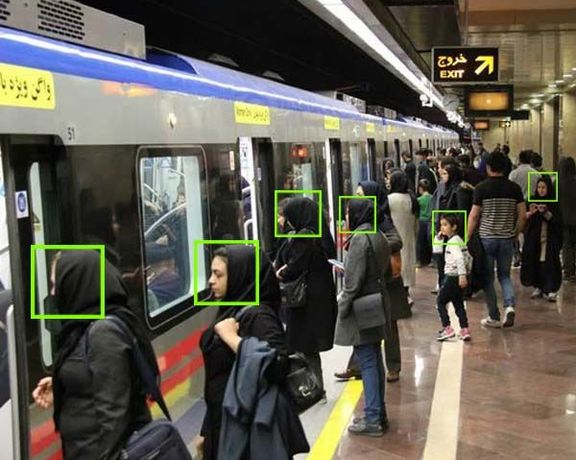
Iran is about to start using cameras in the metro to track and identify women who do not observe the compulsory Islamic dress code – or hijab.

Iran is about to start using cameras in the metro to track and identify women who do not observe the compulsory Islamic dress code – or hijab.
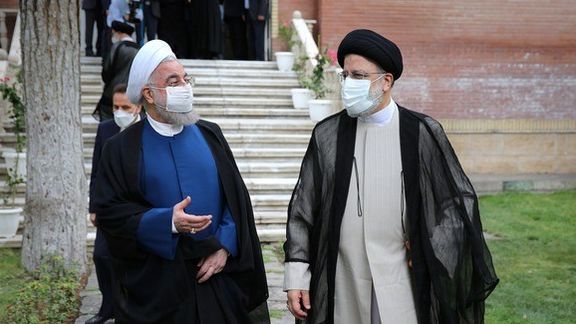
Disclosures about a $3 billion corruption case at one of Iran's biggest steel plants, has put the governing hardliners in the center of the embarrassing case.
While conservative camp thought the disclosure would discredit the ‘Reformist’ government, the details of the case have affected the reputation of many of its figureheads, including clerics.
In a belated report on the case, IRGC-linked Fars news agency tried to cover up the corruption case at Mobarakeh Steel Company (MSC), claiming that a major part of the figure involved is about the difference in the price of steel at different times. The report further claimed that Iran International and BBC Persian have been putting gasoline on the fire to disturb the Iranian public's mind.
Moderate news website Rouydad24 observed in a report that hardliners at the Iranian parliament initially launched the investigation and published the results to discredit the reformists.
Rouydad24 said in the report that "The hardliners in parliament who disclosed the corruption case never thought that anyone would read a 300-page report to find out about the damning details. They thought people would only listen to their rhetoric about the case."
But social media activists published a ten-page document including the names of tens of Iranian hardliners and individuals and organizations linked to them who had received hefty sums from the Steel Plant. These included many media outlets, such as news agencies, newspapers, websites and even the state television that operates under the supervision of Supreme Leader Ali Khamenei.
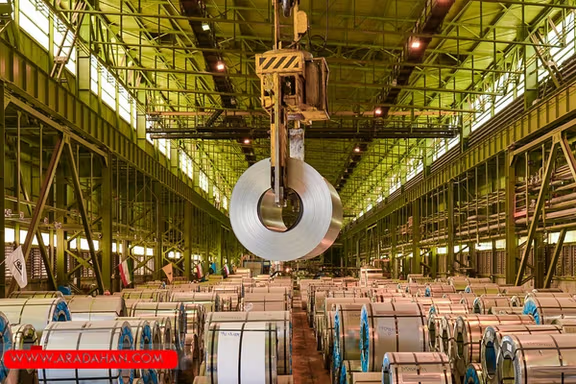
Reports also indicate that several social media influencers were also paid possibly to turn a blind eye to the illegal payments by the MSP. Saba Azarpeik, a whistle blower on social media later said that she was offered large sums of money to stop writing about the case.
When the disclosure backfired, it was revealed that many Friday prayer imams were paid by the steel plant. None was seen to refute the reports. Also, newspapers such as the IRGC-linked Javan and Khamenei-linked Kayhan did not try to deny having received money from the MSC. Those who issued denials in the reform camp included a newspaper publisher who said he had received hundreds of billions of rials (tens of thousands of dollars) for writing only three articles about the steel plant.
According to Rouydad24, even some of the lawmakers involved in the investigation were themselves implicated in the corruption case.
The Majles (parliament) that had initially ordered, conducted and published the results of the investigation tried to distance itself from the matter and sent the case to the Judiciary for further investigation.
Iran's Chief Justice Gholamhossein Mohseni Ejei said subsequently that a special court and a special prosecutor have been tasked to launch an investigation into the case. However, no further action seems to have been taken, at least in public, to address the concerns, other than President Ebrahim Raisi's order to fire the MSC managers who violated the law.
To explain the magnitude of the money involved in the case, 3.5 billion dollars, some Iranian social media users reminded that Elon Musk's investment on the Spex project this year was $2 billion.A study conducted by social media researcher Mohammad Rahbari said some 17,000 tweets in Persian were posted by Iranians on the MSC corruption case in less than one week, adding that half of "liked" posts were those that criticized the government and reiterated that Iran was plagued by systematic corruption.
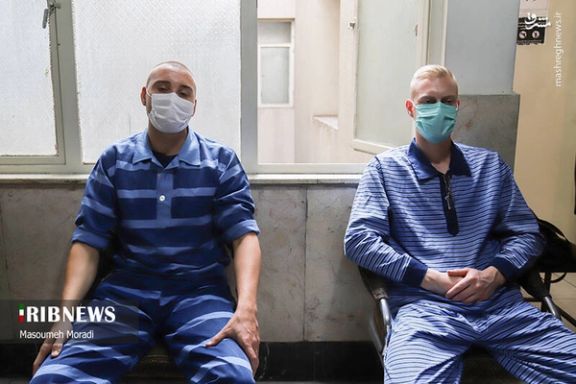
An Iranian court has sentenced two Swedish citizens to eight and five years imprisonment and lashes for drug trafficking.
During a weekly press conference on Tuesday, Judiciary spokesperson Masoud Setayeshi said the two, identified as Stephen Kevin Gilbert and Simon Kasper Brown, were arrested in January 2020 at an airport in Tehran as they were about to leave the country with large quantities of opium-based narcotics.
"Simon Kasper Brown was sentenced to five years in prison and a fine of about 10 billion rials (about $34,000) for transporting more than 21,000 illegal pills of tramadol," an opioid painkiller, and "Stephen Kevin Gilbert was sentenced to eight years in prison, 60 lashes and a fine, for being in possession of 9.8 kilograms (21 pounds) of opium resin," he said.
The trial of the men — accused of being part of an “international drug trafficking gang” — opened in September 2021. Iran is a key smuggling route for opium and heroin from neighboring Afghanistan, the world’s largest producer.
The judiciary spokesman noted that the case of the pair is different from the Swedish man arrested in July on allegations of “espionage,” whose case is being investigated but his identity has not been revealed.
Tensions are relatively high between Tehran and Stockholm over a Swedish court’s sentencing of former Iranian jailor Hamid Nouri to life imprisonment over executions of political prisoners in 1988.
Earlier in the month, Sweden started planning for the prosecution of two Iranian-Swedish brothers who were arrested in 2021 over allegations of espionage for Iranian Intelligence organizations.
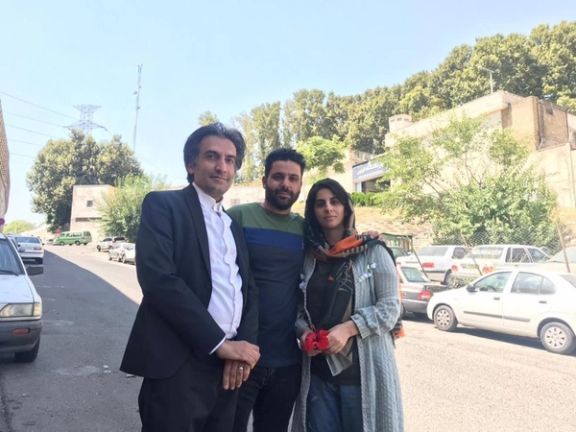
Sepideh Rashno, an Iranian woman who refused to wear a headscarf and whose video of a quarrel with a hijab enforcer went viral last month, has been released on bail.
Reshnou was released from Tehran’s Evin prison on Tuesday after about 40 days of detention with a bail of about $27,000, a huge sum for ordinary people in Iran. She has been charged with propaganda against the Islamic Republic.
Earlier in the month, Revolutionary Court Judge Iman Afshari said that Rashno was summoned from the prison and was served her indictment issued by the prosecutor's office.
She is accused of “association and collusion with the intention of committing a crime against the country's security through communication with foreigners and propaganda activity against the Islamic Republic and encouraging people to commit corruption and prostitution."
On August 15, some women's rights activists staged flash mobs in Tehran to demand information on her whereabouts. She was reportedly in detention at the IRGC ward of Tehran’s Evin Prison since her arrest on July 16 after she argued with a woman enforcing hijab rules.
In a move that was condemned by many activists and people on social media, the state-run television (IRIB) aired on July 31 the so-called ‘confessions’ of the 28-year-old artist, writer and editor.
She was apparently tortured and forced to denounce herself and other activists, and express regret for her confrontation with the hijab enforcer and posting her video on social media. She had been so brutally beaten before the telecast that she was suffering from internal bleeding.
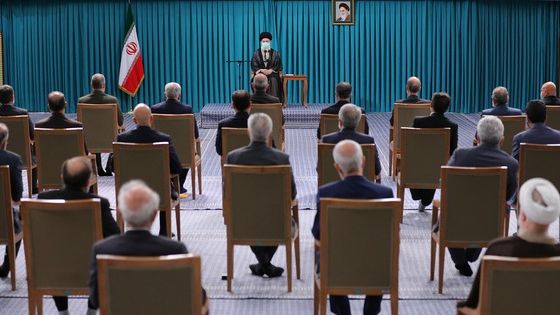
The government has brought renewed hope to Iranians, Supreme Leader Ali Khamenei said Tuesday to defend President Ebrahim Raisi against mounting criticism.
In a meeting that takes place with the president and his ministers every year at the end of August, Khamenei found few concrete accomplishments to praise – something he usually does on this occasion.
Many politicians, social media activists and even allied hardliners have been criticizing Raisi for his economic performance, as inflation has risen, and he has been unable to deliver on his election promises.
Reports in the Iranian media about Khamenei’s remarks did not mention any comment on the ongoing nuclear negotiations that can lift sanctions and ease the mounting economic problems.
Khamenei told members of the government that “In my opinion your most important success has been to reawaken hope among the people.”
This is exactly what has been the subject of countless articles and interviews, even in Iran’s censored media, which began just weeks after Raisi took office a year ago. Many politicians and pundits have warned in the past months that people are losing hope and there is a high danger of a social explosion.
Since the United States withdrew from the JCPOA nuclear agreement and imposed sanction in 2018, Iran’s economic indicators of falling real wages, high inflation and increasing poverty have gotten worse by every passing quarter.
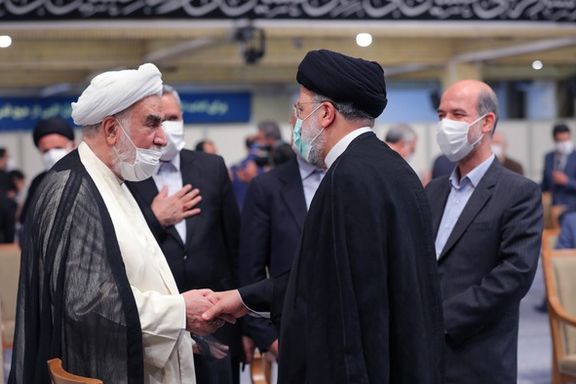
Raisi inherited the last one year of this difficult equation, but his domestic critics also insist that he did not have the experience to be chief executive. Similarly, they criticize his top aides and ministers for being second and third-rate functionaries, incapable of operating in the difficult financial environment.
Khamenei advised the government to pay close attention to inflation, economic growth, investments, employment, per capita income and the financial gap among social classes. While he prioritized these issues, he did not say how the government can deal with them amid sanction on oil exports and Iran’s international banking ties.
Khamenei also went on to praise Raisi’s frequent visits to provinces, also criticized by politicians as an ineffective exercise when the president has few tools to improve conditions around the country.
Riaisi in these visits often hears complaints and is faced with requests that he usually promises to address, while critics say most of these pledges remain on paper.
Khamenei also praised Raisi’s for not complaining or indirectly criticizing him. The previous president Hassan Rouhani and his supporters occasionally hinted that they did not have enough freedom of action, meaning that key decisions had to be approved by Khamenei.
Apart from numerous personnel and economically significant issues, the Rouhani government was not allowed to hold talks with the United States to find a solution for the nuclear issue and remove the crippling American sanctions.
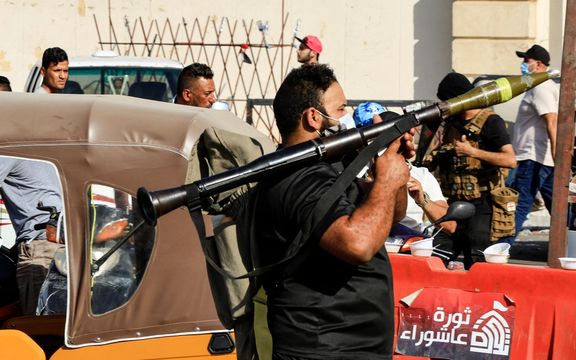
Nearly 20 people were killed in Iraq on Monday as opposition cleric Moqtada al-Sadr’s supporters clashed with Iran/backed militia groups in major cities.
Clashes continued Tuesday, as Iraqi militias fired several rockets at Baghdad’s fortified Green Zone for a second day as hostilities intensified between rival Shi’ite Muslim groups, the military said.
Iran International’s correspondent in Iraq reported Tuesday that Sadr’s armed supporters have occupied all bridges on the Tigris River in Baghdad, except one crossing that kinks to the venue of a gathering by their opponents.
Just before noon local time, our correspondent also reported that pro-Iran politician and former prime minister Nouri al-Maliki's residence in Baghdad was surrounded by Sadrist crowds but pro-Iranian militia were using heavy weapons to defend it. Allegedly dozens of Sadr's supporters were wounded by gunfire.
She also reported that many websites affiliated with political groups, including some belonging to the government, were unavailable on Tuesday.
Streets were mostly empty of ordinary people as gunmen cruised in pickup trucks carrying machine guns and brandishing grenade launchers. Overnight, sustained gun and rocket fire rang out across the Iraqi capital.
Clashes on Monday, which killed nearly 20 people, jolted Iraq into new violence as supporters of al-Sadr, a former anti-US insurgent leader, faced off with Shi’ite armed groups mostly loyal to Iran.
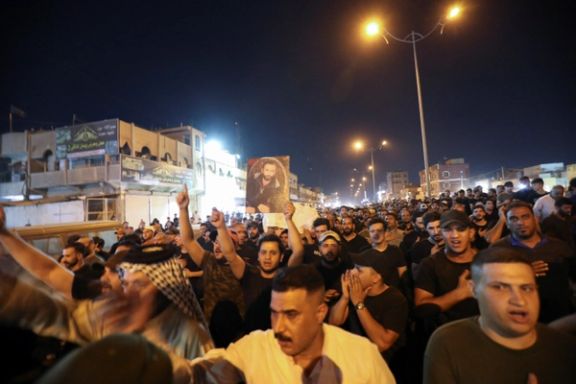
There were reports Monday night that pro-Iran militia fired at Sadrists in Baghdad’s Green Zone, but it is not clear if how many people were killed. In turn, Sadrists said they were targeting offices and bases of pro-Iranian armed groups.
Many foreign governments have urged citizens to leave Iraq. Iranian media reported that all air and land borders with Iraq are closed, as the Iranian embassy in Baghdad and other missions face attacks by Sadrists.
A prolonged political deadlock after an October election, during which the two camps have competed for power, has given the country its longest run without a government and led to new unrest as Iraq struggles to recover from decades of conflict.
This time, the fighting is among the Shi’ite majority that has ruled Iraq since the 2003 US invasion which toppled Sunni dictator Saddam Hussein.
Sadr has positioned himself as a nationalist who opposes all foreign interference, whether from the United States and the West or from Iran. He commands a thousands-strong militia and has millions of loyal supporters across the country. His opponents, longtime allies of Tehran, control dozens of paramilitary groups heavily armed and trained by Iranian forces.
Sadr and his opponents have long dominated state institutions and run large parts of the Iraqi state.
Part of Sadr’s support comes from disgruntled Iraqis who launched anti-government protests in 2019, lasting for months and met opposition from Iran-linked groups. These Iraqis were demanding efficient governance and blamed Iran for interfering in Iraq politics and contributing to corruption and lack of services.
Iraq is one of the world’s largest oil exporters but nearly two decades after Saddam was toppled, still suffers from lack of some basic services such as reliable electricity for people.
With reporting by Reuters
Mohammad Saleh Hashemi Golpayegani, the secretary of Iran’s Headquarters For Enjoining Right And Forbidding Evil, tasked with promoting the clerical regime’s interpretation of Islamic morals, confirmed the move in an interview published on Tuesday, adding that the subway CCTV cameras are programed to use face recognition technology to take a photo of the unveiled women.
He added that the photos will be matched against the database registered for the women’s national ID cards to identify them and then a ticket with a significant fine will be sent to them.
Golpayegani had previously said that about half of the Iranian women currently do not observe the mandatory hijab rules.
In recent months the Islamic Republic’s government and security agencies have intensified their efforts to pressure women into abiding by the hijab laws and several rounds of anti-hijab civil disobedience campaigns followed. The patrols by the “morality police” have increased on the streets and between people and hijab enforcers are surfacing on social media every day.
Authorities are hailing those who harass women for their insufficient hijab and security forces stepped up detention of women in the streets for their loose hijab.